How Eating Salmon Can Help With Hair Loss, According to Dietitians
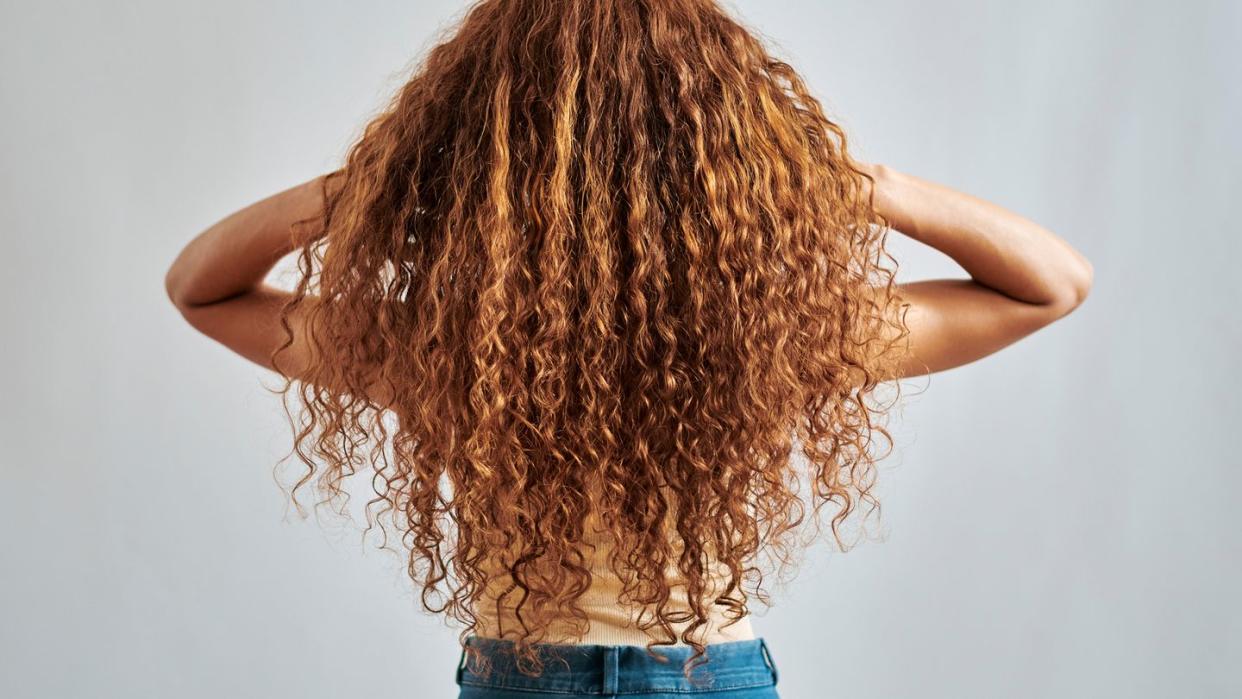
Whether you keep your hair in a cute pixie cut, long, flowing locks or natural curls or coils, you likely want it to stay as lush and healthy as possible. Now, your hair growth and thickness are not entirely in your control — stress, genetics, environmental factors and more. But one thing you can take control of is how you nourish your strands, by choosing foods filled with the vitamins and minerals that are the building blocks of healthy hair (you may also want to visit a dermatologist to see if there are any medical issues, and discuss the best products to use or avoid with your hairstylist). Keep in mind that fluctuating hormones due to pregnancy or menopause can also change the texture of your hair, and how much you lose in the shower every morning.
But let's talk now about how the foods you put in your mouth can affect the hair that comes out of your head. For starters, if you really want a lush head of hair (not to mention healthy skin and nails), you need to make sure you're getting the key nutrients necessary for keeping those body parts at their best.
The best vitamins and nutrients for hair growth include:
Lean proteins
Omega-3 fatty acids
Fat-soluble vitamins
B-complex vitamins
Iron
The best type of diet to get all these nutrients every day without even thinking about it is the Mediterranean-style diet, which is packed with fiber-filled produce, 100% whole grains and healthy fats. This style of eating also includes foods to support your gut microbiome, and having a healthy gut flora is essential for helping with nutrient absorption to bolster the hair, skin and nails. If you are looking for ways to add hair-healthy foods to your diet, start by eating more of these delicious meals.
Salmon
You've heard nutritionists raving about salmon for years, and there's good reason: Salmon is one of the most nutritious types of fish, offering amazing health benefits, from keeping your heart healthy to improving mood and fighting inflammation. Salmon is also an excellent source of omega-3 fatty acids, a key nutrient for healthy hair. In one study, a majority of women who took omega-3 and other supplements reported a reduction in hair loss as well as an improvement in hair diameter and hair density. Your body doesn't naturally produce omega-3s, so you will have to get them from food or supplements.
This oily fish also does wonders for hair health because it’s rich in protein, selenium and vitamin D and B vitamins. These nutrients work together to keep hair strong and healthy. Many health organizations recommend eating two servings of fish per week, and salmon is a delicious and versatile option you’ll want to add to your grocery list. If you don't eat seafood, talk with your healthcare provider to see if taking a supplement is the right plan for you. Omega-3s are also found in some nuts and seeds, such as flaxseeds, but it's in a different form.
RELATED: 15+ Salmon Dinner Recipes That Are Beyond Tasty

Berries
Whether you prefer blackberries, strawberries, raspberries, or blueberries—or better yet, a colorful mix—these tasty little snack-size fruits are loaded with antioxidants that protect your body and hair by protecting cells from the damage of free radicals. It’s also key for the production of collagen. Strawberries, in particular, are a nutritional dynamo, with about 150% of your daily vitamin C needs in one cup of sliced berries. The red berries may even help control blood pressure and support brain health, keeping everything in and on top of your head in great shape.
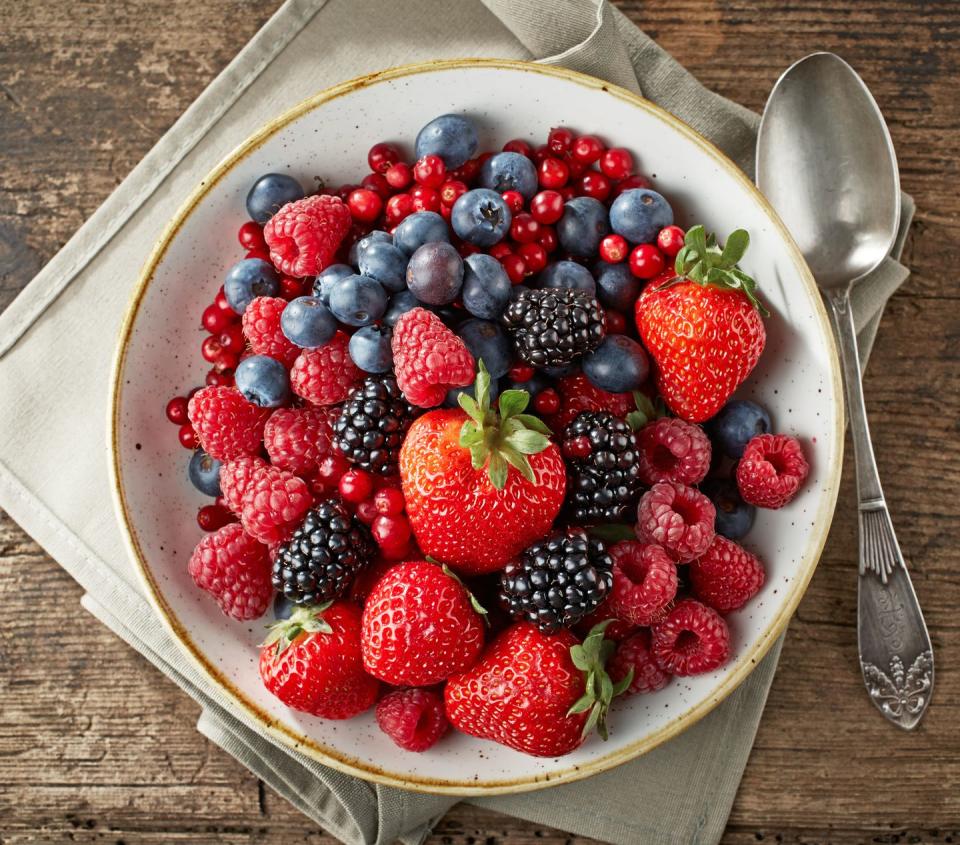
Oysters
You may just think of oysters as a decadent, briny treat to have with a glass of champagne when you’re celebrating an anniversary or a big date, but the sea creatures are the single best way to get zinc in your diet, with 28 to 32 mg per serving, depending on whether you eat them cooked or raw. (For comparison, next on the list is beef, with just 3.8 mg per serving). Zinc is considered crucial for hair growth, and some research has associated a lack of zinc in the diet with telogen effluvium, a type of hair loss. They’re also an excellent source of protein, iron, and vitamin D.
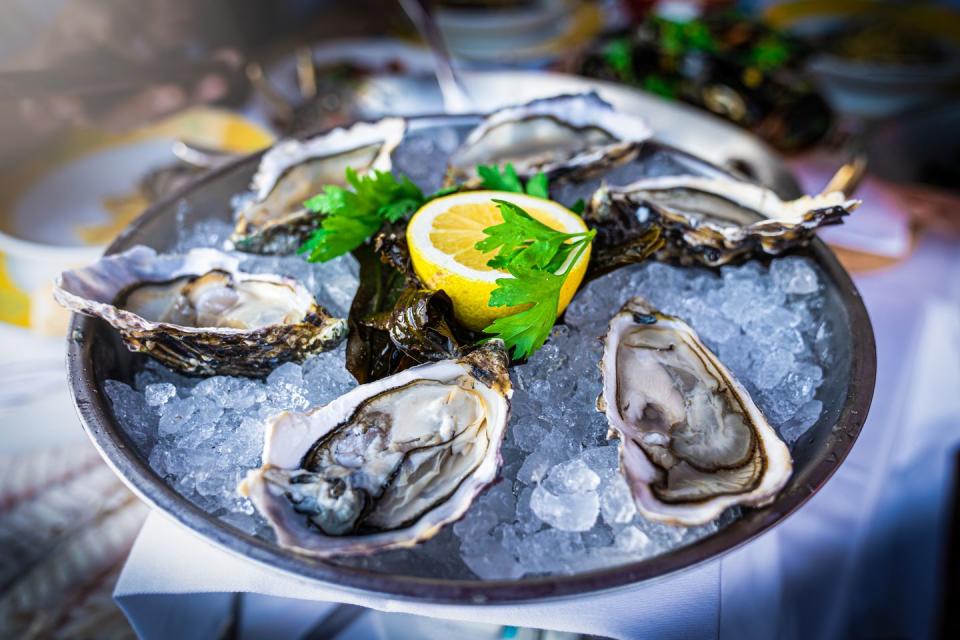
Eggs
Eggs are chock full of protein and essential nutrients that contribute to hair health, such as choline, iron and vitamins A, D and B12. Lutein and zeaxanthin, two substances found in eggs, also play a key role in maintaining cellular health, especially of the eyes, skin, and hair. (A tip: Most of the vitamin D is found int the
yolk, so don't be afriad of eating the yellow part!)
Eggs are also rich in a B vitamin called biotin that helps hair grow. On the flip side, a deficiency of biotin can lead to hair loss, and you may be at risk for a biotin deficiency if you are pregnant or breastfeeding, malnourished or have certain gastrointestinal disorders like Crohn's Disease. One study suggests that for people with a biotin deficiency, taking a biotin supplement may prevent hair loss.
Try these easy egg recipes at home.

Nuts
Aside from those who are allergic, who doesn't love to snack on crunchy, salty peanuts, cashews, almonds and walnuts? These are all great sources of protein, healthy fats, biotin and zinc which support healthy tissue development on the scalp and can help stimulate hair growth and prevent hair loss. Nut butters are also a tasty nutrient-dense option as they can give you those hair-growth-supporting nutrients.
Peanuts are a significant source of biotin, healthy fats and minerals like zinc known to both stimulate hair growth and prevent hair loss — a ¼ cup serving packs up to 9 grams of protein, 4 grams of fiber and a unique mix of antioxidants.
Brazil nuts are packed with selenium, which studies suggest can help with hair growth. One Brazil nut alone has up to 90 micrograms of selenium, so you’ll want to limit your intake to no more than four Brazil nuts per day. Selenium is also important for the production of thyroid hormones which help to regulate hair growth.
RELATED: 6 Healthiest Nuts to Eat
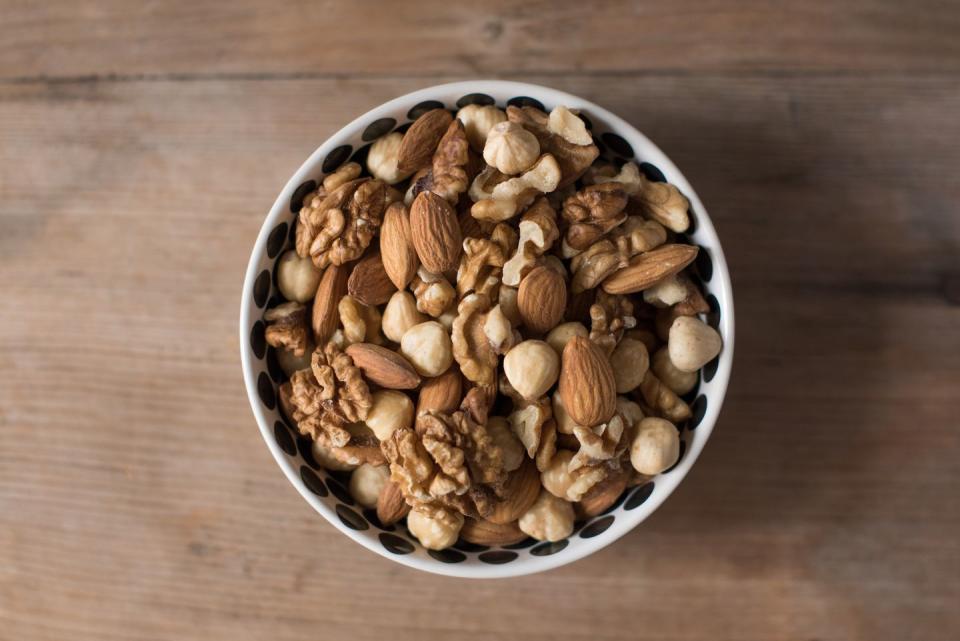
Sardines
As you can see from this list, eating seafood is good for your hair, even the kind that comes in tine. Sardines are filled with hair-boosting nutrients like omega-3 fatty acids which may reduce hair loss and increase hair density, and vitamin D which supports hair follicle development.
Vitamin D is vital in supporting hair growth, and when your body lacks it, new hair growth can be hindered or stunted, especially in those with chronic hair loss. In particular, perimenopausal women are at risk for vitamin D deficiency. If you opt for canned sardines with bones, you’ll also get a big boost (about 325 mg) of calcium, which plays a significant role in keeping hair healthy.
A single serving of sardines also has 25% of the recommended daily value of iron, a mineral important for preventing hair loss. Try adding sardines to salads, stews and spreads as a lower-mercury alternative to other fatty fish.
RELATED: The 10 Healthiest Fish You Can Eat
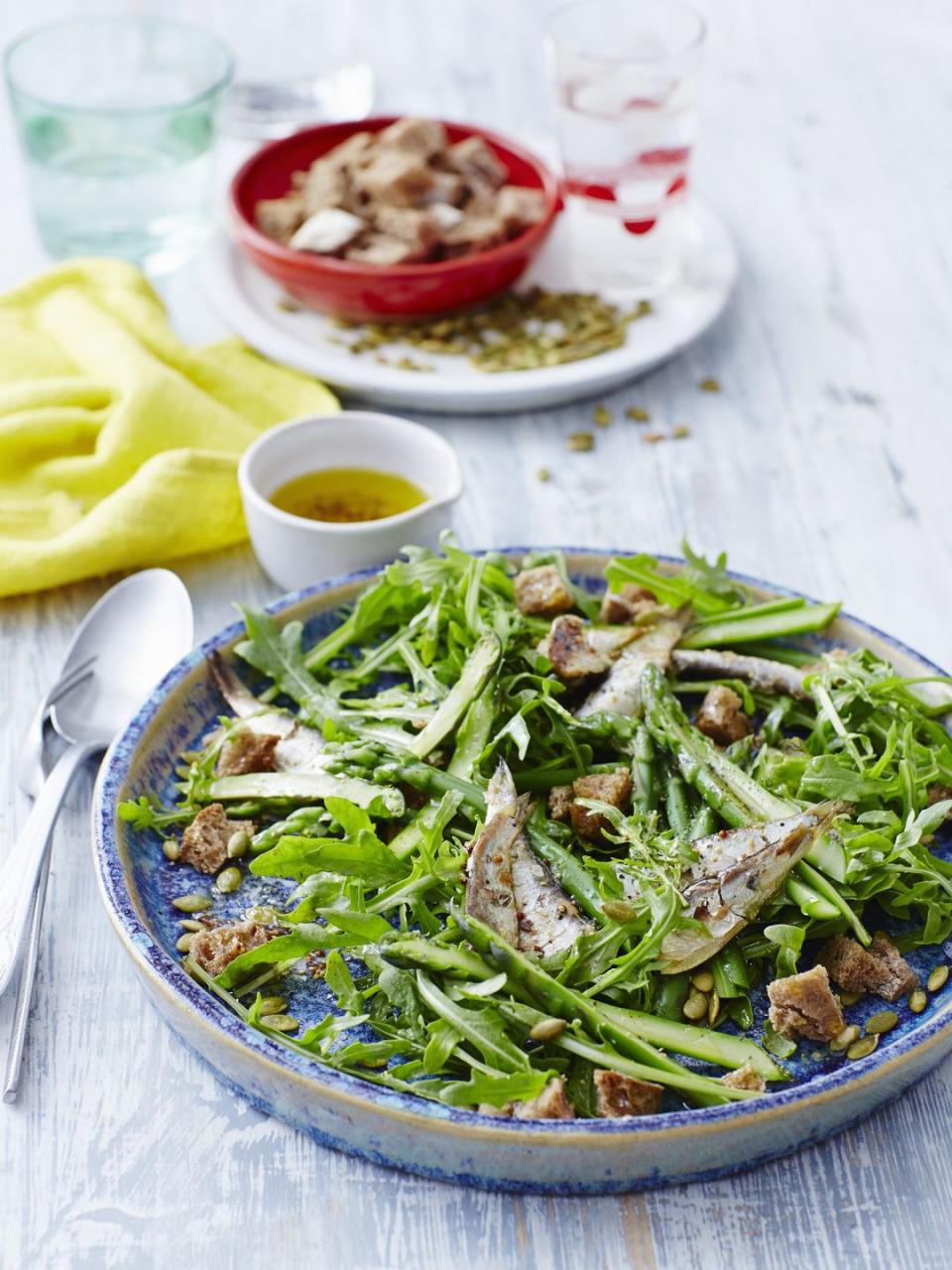
Chia Seeds
Formerly known as the little seeds that sprouted "hair" or novelty gifts, chia seeds are now well-loved as a nutritional powerhouse. They are a vegan source of omega-3s and are filled with gut-loving fiber and disease-fighting antioxidants. Chia seeds are also considered a complete protein, containing 20% more protein than soybeans, and can keep your scalp healthy and promote beautiful, luscious hair.
Chia seeds also contain zinc and copper, two key minerals for overall hair health. Zinc is considered an enzyme activator which stimulates protein transformation, vital for hair growth. Copper plays a significant role in regenerating new hair growth and can leave your hair feeling thick and voluminous by increasing the follicle size.
You’ll want to be sure that you’re getting the recommended amounts of zinc and copper from a variety of foods. A deficiency of these minerals in your diet may suppress hair growth. These tiny, shelf-stable seeds can be added to cereal, smoothies, puddings and even as a heart-healthy boost in baked goods.
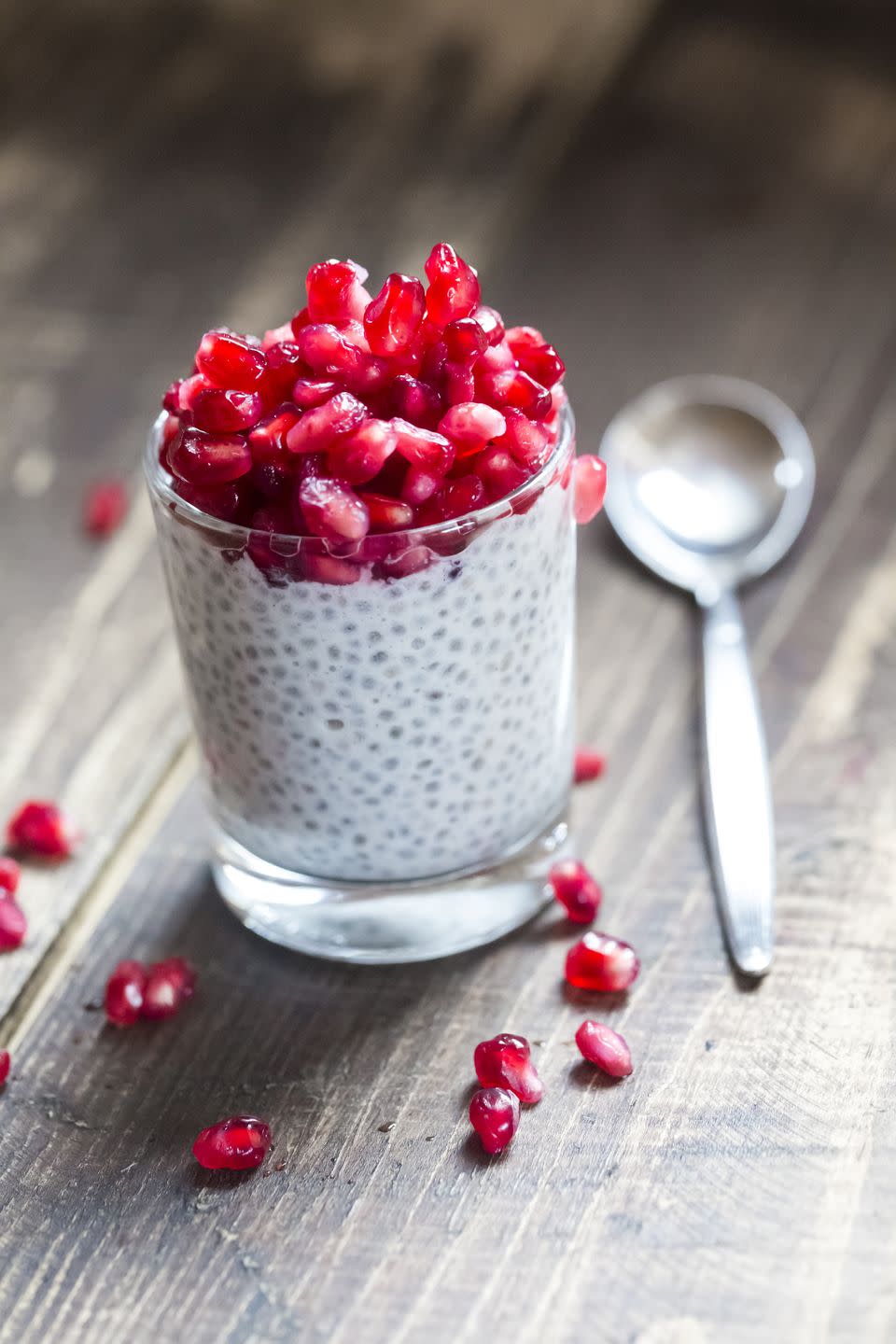
Pumpkin
Pumpkin is no longer just for spiced lattes and Halloween decorations: The festive gourds contain multiple nutrients that keeps your hair flourishing. A half cup of your favorite squash contains a mere 83 calories and less than a gram of fat. Plus, it’s loaded with iron and beta-carotene, the precursor to vitamin A — an important vitamin for hair growth and strength. Pumpkin also is full of vitamins C and E that help repair your body's cells from damage.
Another underrated mineral that plays a significant role in more than 600 functions in the human body and may also contribute to healthy hair growth is magnesium. Magnesium is very involved in protein synthesis and the hair growth cycle. Without magnesium, protein synthesis can be disrupted which may increase the risk for problems with hair growth and structure. Load up on the canned puree and use it in sauces, protein dishes, and even in snacks to help keep hair at its healthiest.
RELATED: 40+ Sweet and Savory Pumpkin Recipes

Avocado
The ultimate in deliciously heathy breakfasts—we love it smashed on whole grain toast sprinkled with sea salt—the creamy avocado is packed with healthy fats and biotin. It's also a popular ingredient in many DIY hair masks (hello, self-care Sunday). Avocados also contain Vitamin E, an antioxidant that nourishes the hair. In just one medium-sized avocado, you’ll get around 28% of your daily vitamin E needs. It even protects the scalp from oxidative stress and damage which, if not well nourished, can result in poor hair quality.
One preliminary study suggests that in people experiencing hair loss, vitamin E might help increase hair growth thanks to the powerful antioxidant activity of tocotrienols, which can counter the effects of alopecia, an autoimmune condition which results in sudden hair loss.
Take your next salad or sandwich to the next level with these tasty, nutrient-dense avocado recipes.

Buckwheat
Speaking of avocado toast, swapping out white refined carbohydrates for 100% whole grains can help you amp up the zinc, iron, and B vitamins in your diet to support healthy hair among many other benefits. Buckwheat, a whole grain, is a nutritious gluten-free seed that is filled with key antioxidants and fiber, which can help you fill up faster. Use it as a swap for oatmeal at breakfast or rice in a stir-fry, and try buckwheat-based Udon when making ramen or other noodle dishes.
And if you’ve never heard of “silica” before, it’s known to be the “beauty mineral." Silica is an abundant trace element found in the human body and is also present in whole grain foods. It may help prevent hair thinning and strengthen hair. According to one scientific review, silica delivers key nutrients to the hair follicles and scalp.
Check out these healthy whole grain options that have a similar nutrition profile to buckwheat.
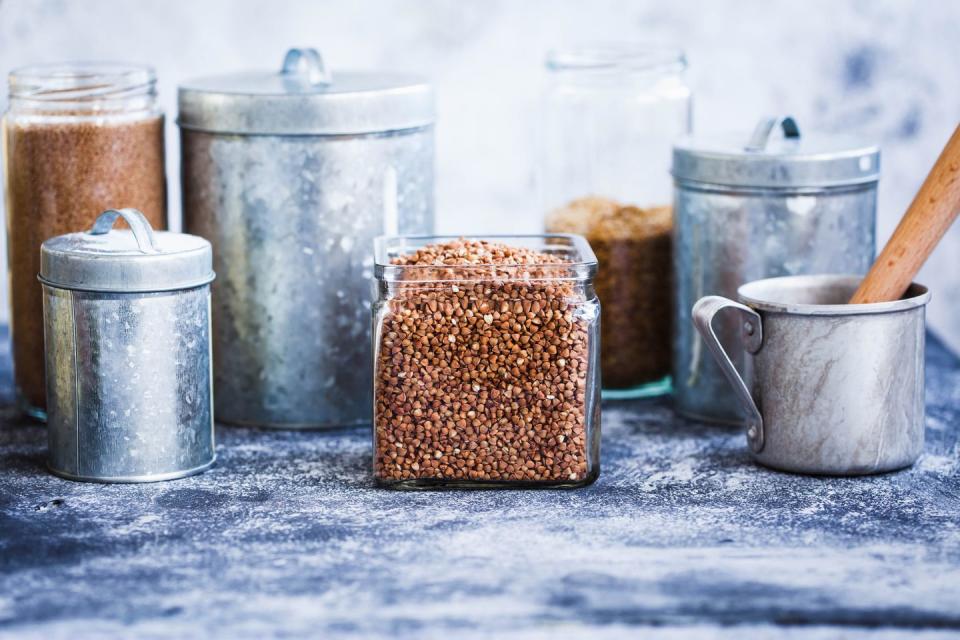
Chickpeas, Lentils, Beans and Peas
Hair follicles are made up of protein, so it makes sense that eating protein is a great way to support hair growth. If you're looking for a vegetarian alternative to animal proteins, try pulses (the dry, edible seeds of veggies) like chickpeas, lentils, beans and peas.
Pulses are full of protein (for example, a cup of lentils has 18g protein) and contain folate, a B-complex vitamin vital for hair growth. In fact, a severe deficiency in folate can result in a condition called folate-deficiency anemia which has symptoms like hair thinning and pigmentation changes in the hair.
Adults should aim for about 400 micrograms of folate (one cup of chickpeas contains 72 micrograms of folate). If you’re stuck on what to make for a simple weeknight dinner, try these tasty lentil recipes.

Plain Greek Yogurt
Unsweetened plain Greek yogurt contains tons of protein which is the building block for gorgeous hair. Plus, plain Greek yogurt is very versatile and can be incorporated into a filling breakfast (think smoothies and parfaits) or savory fare (like dips and condiments).
The greatest attribute of yogurt is its probiotics, which are the good bacteria that help your body absorb nutrients to maintain healthy growth and to sustain a normal, regular hair cycle. In one recent study, probiotics were found to promote hair growth.
Quick tip! Choose brands that have five strains or more of bacterial cultures per 6-ounce serving.
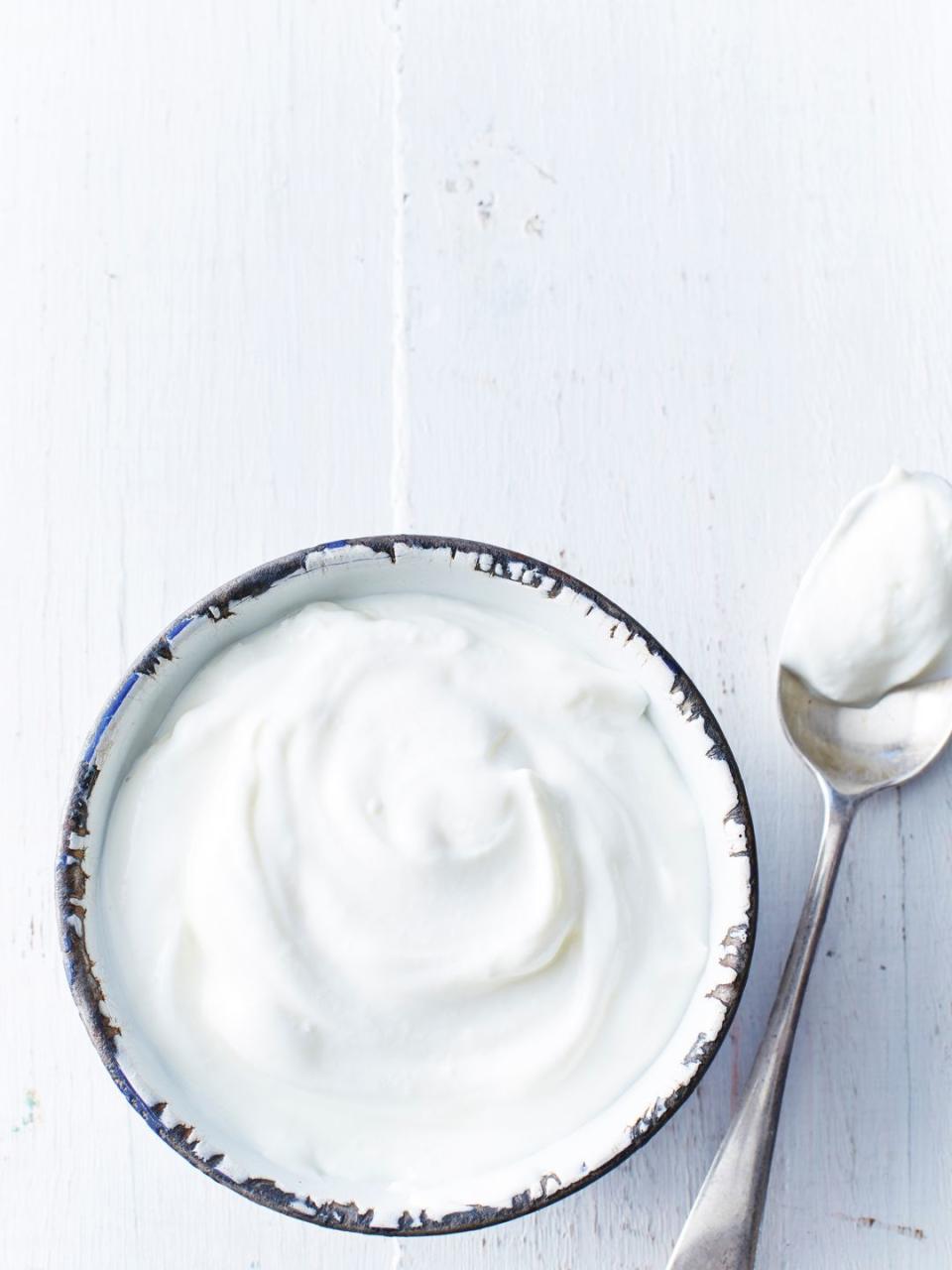
Whole Foods vs. Supplements for Healthy Hair: Does it Matter?
The health of your hair is complex and may depend on dietary, lifestyle and environmental factors. When it comes to meeting your nutritional needs in the most hair-healthy way, experts recommend food over supplements. Nutrients in foods are more easily absorbed by the body than those in supplements.
However, supplements can provide a higher concentration of specific nutrients that may be hard or impossible to get from your diet, like vitamin D and omega-3 fatty acids. Before starting any supplement regimen, or if you've recently noticed significant hair loss, speak with your doctor.


You Might Also Like

 Yahoo Movies
Yahoo Movies 
